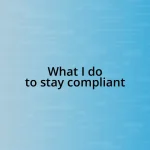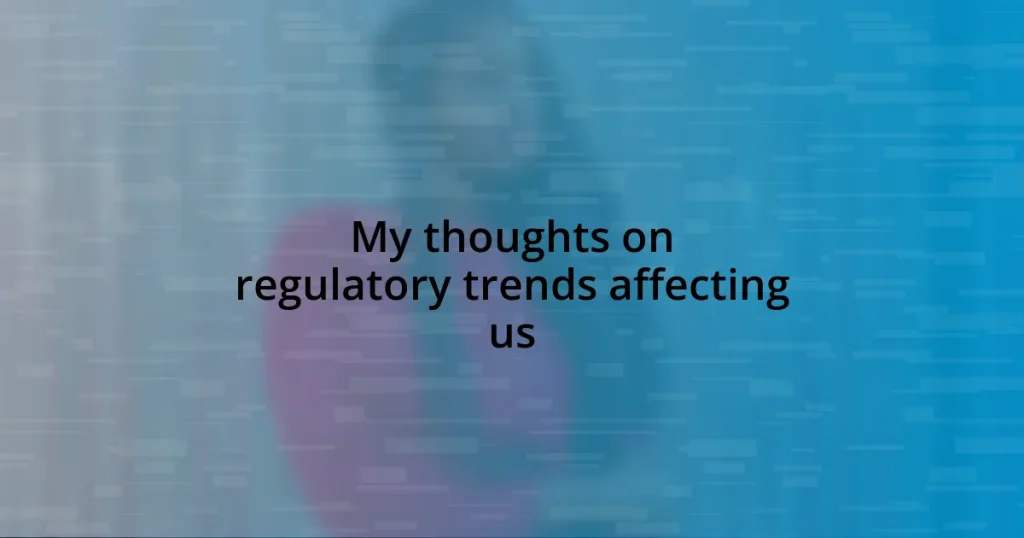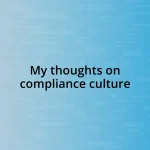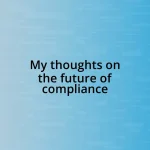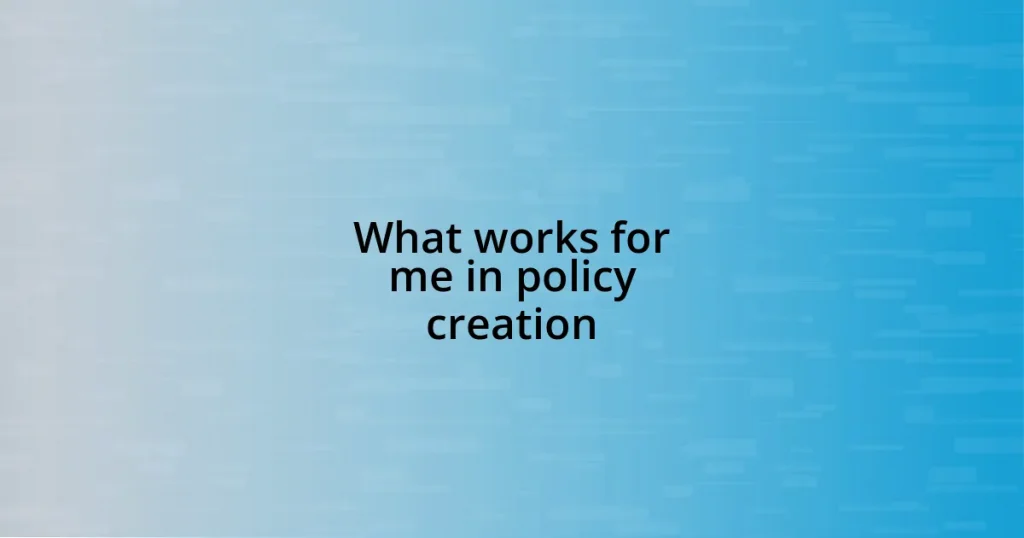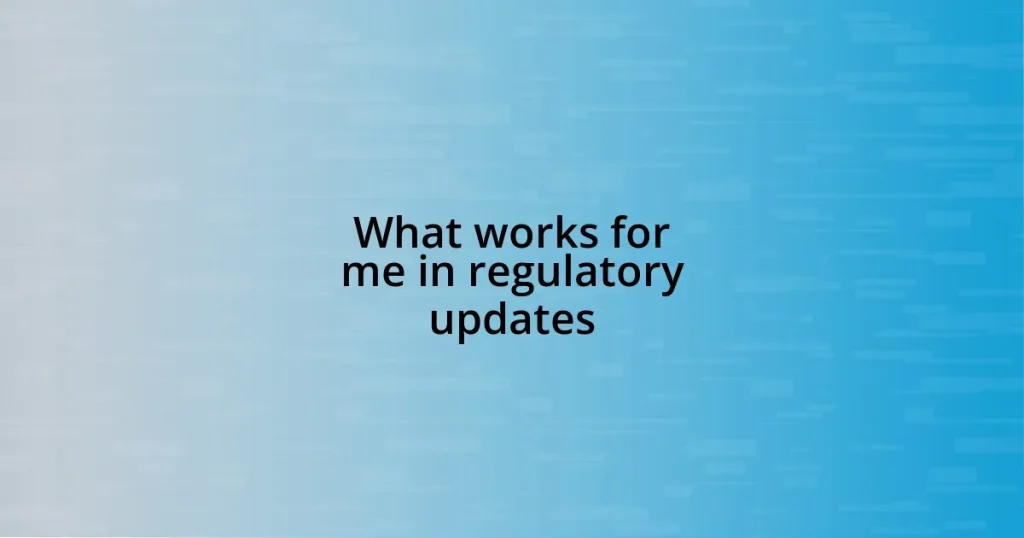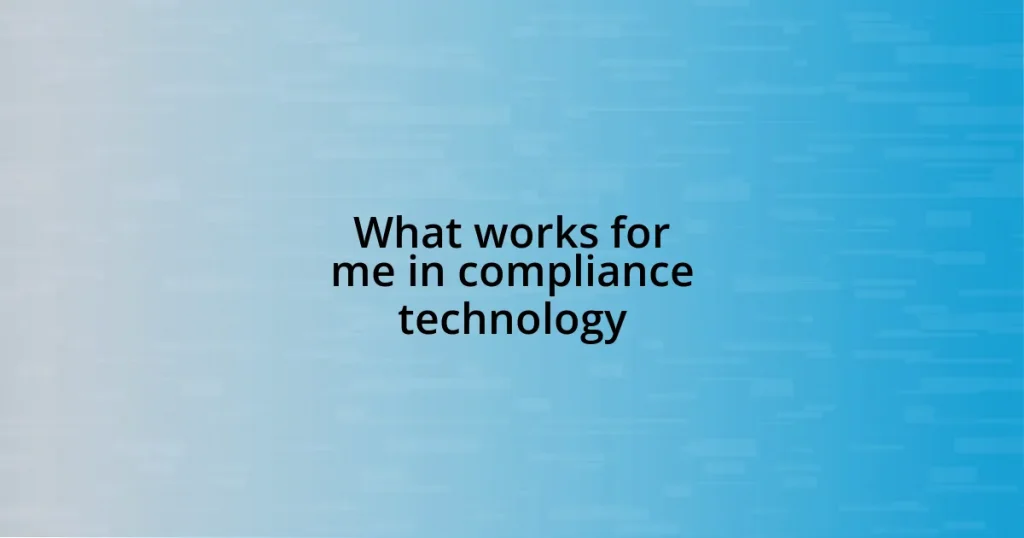Key takeaways:
- The shift towards data privacy and cybersecurity regulations highlights the need for stronger consumer protections and accountability among businesses.
- Regulatory changes in 2023 focus on sustainability, encouraging industries to adopt eco-friendly practices, which can lead to new market opportunities.
- Compliance can stimulate innovation, but it also presents financial and operational challenges, particularly for small businesses.
- Fostering a culture of compliance and leveraging technology are crucial for organizations to navigate evolving regulations effectively.
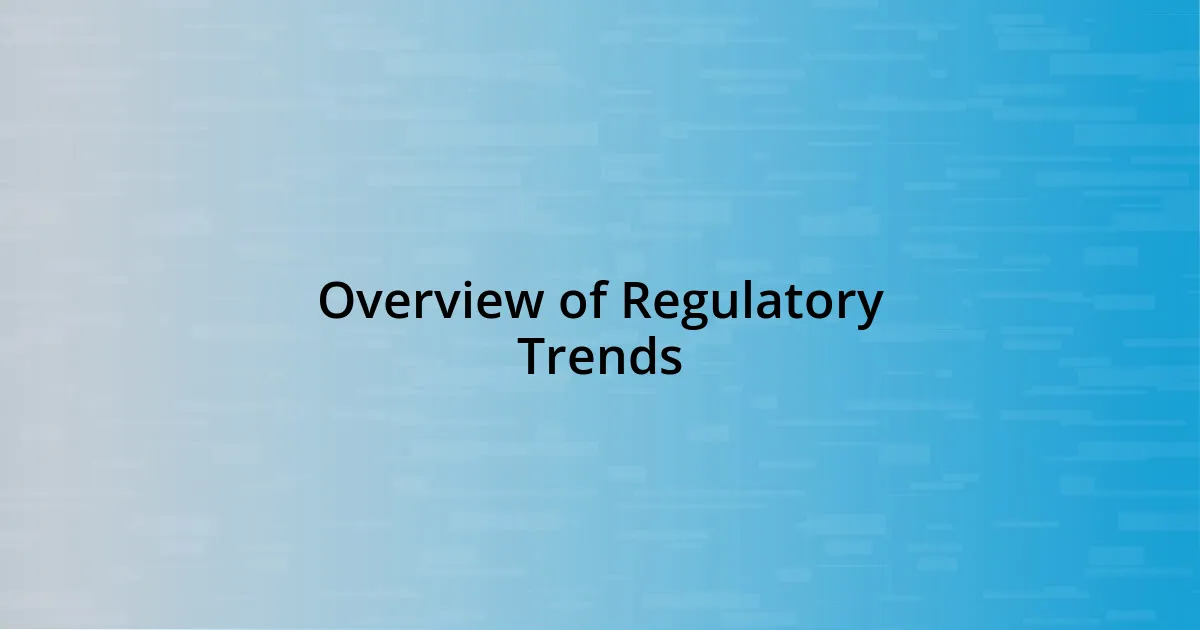
Overview of Regulatory Trends
Regulatory trends are constantly evolving, often in response to technological advancements and societal shifts. I recall a time when data privacy was merely a buzzword; now it’s a crucial component of regulatory frameworks globally, especially with the rise of the GDPR. Isn’t it fascinating how something that felt remote and theoretical can suddenly become a cornerstone of our everyday interactions?
In recent years, there’s been a noticeable push towards sustainability in regulations. For instance, I’ve observed various industries adjusting practices to meet stricter environmental standards, driven not just by law but by consumer expectations. This presents a unique challenge—how do businesses balance compliance with the desire for innovation?
Another trend gaining traction is the emphasis on transparency, particularly in financial sectors. I remember attending a conference where a leader in fintech passionately argued that transparency fosters trust. Don’t you think that when consumers can see behind the curtain, they are more likely to engage meaningfully with services? This shift not only alters operational strategies but also reshapes customer relationships in profound ways.
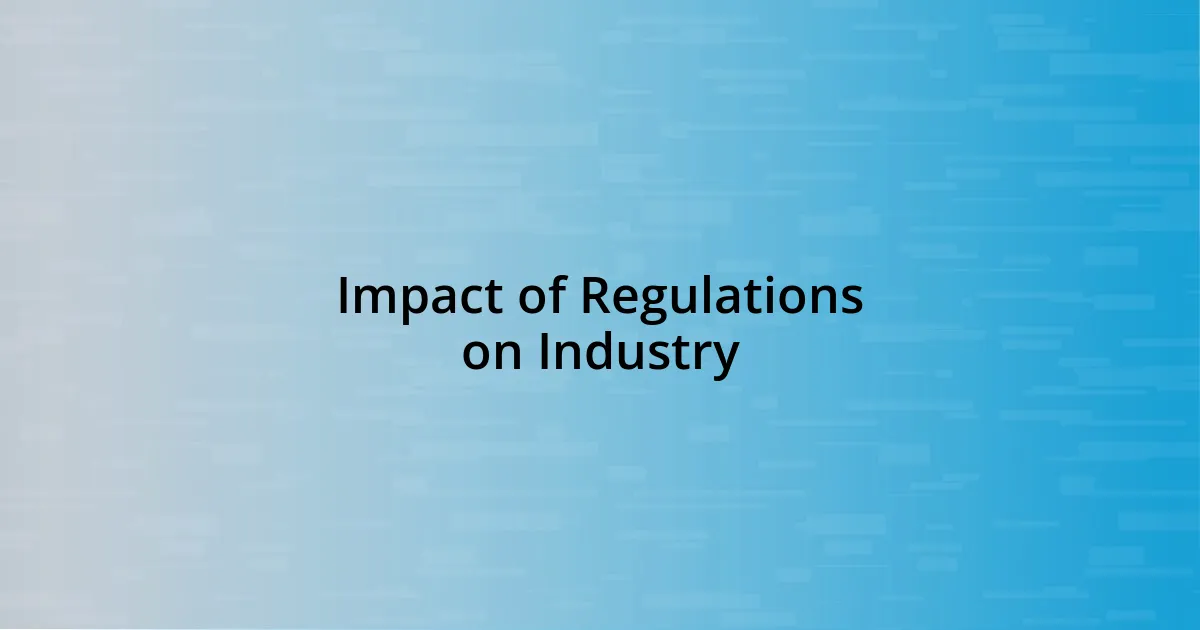
Impact of Regulations on Industry
The impact of regulations on industries can be profound and far-reaching. I remember a time when a colleague in the manufacturing sector expressed anxiety over new health and safety regulations. Initially, it seemed like a burden, but ultimately, those regulations spurred innovation as companies sought to redesign processes for compliance. It’s an interesting dynamic—what looks like an obstacle can often become a catalyst for improvement.
Here are some ways regulations shape industries:
- Innovation Stimulation: Compliance often drives the need for new technologies and solutions.
- Increased Costs: Businesses may face initial financial strain due to the implementation of regulatory measures.
- Competitive Advantage: Companies that adapt quickly to regulations can differentiate themselves in the market.
- Consumer Trust: Stricter regulations can enhance brand credibility and foster customer loyalty.
- Market Entry Barriers: New regulations can deter startups, affecting overall industry growth.
In my experience, I’ve seen how navigating these changes can actually transform a business’s culture, often pushing them toward a more proactive stance on compliance, rather than a reactive one. It’s a delicate balancing act, but one that can lead to greater resilience in the long run.
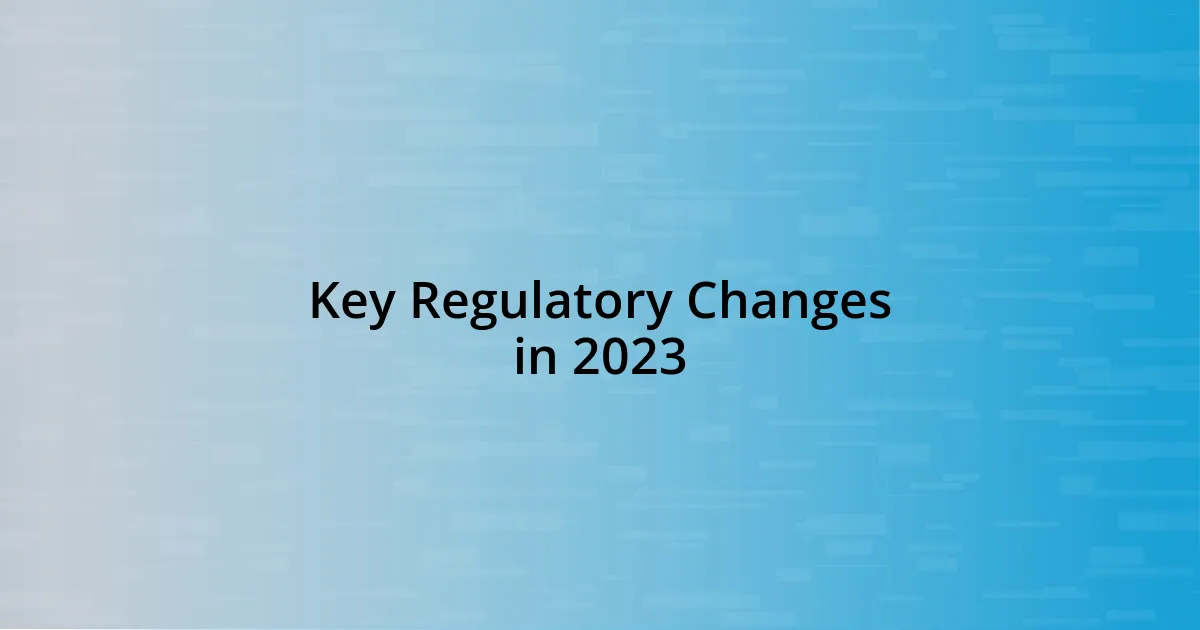
Key Regulatory Changes in 2023
In 2023, significant regulatory changes have emerged, particularly concerning data privacy and cybersecurity. I remember attending a panel discussion earlier this year where experts agreed that with increasing data breaches, regulations would likely tighten even further. It felt reassuring to know that these changes aim to protect consumers while holding companies accountable. The shift underscores the importance of safeguarding personal information, which strikes a chord with me, as I often wonder how much data companies truly need to operate effectively.
Another noteworthy change this year is the rise of regulations focusing on environmental sustainability. I recently spoke with a friend who runs an agricultural business, and they shared how newly implemented regulations compelled them to adopt more eco-friendly practices. Initially daunting, this transition began to open up new markets for them—profitability intertwined with sustainability. It’s moments like this that remind me of the powerful intersection between regulatory demands and business innovation.
Lastly, we can’t overlook the growing emphasis on fintech and consumer transparency. I recall an enlightening moment during a recent webinar, where a speaker pointed out that regulations are pushing for clearer disclosures in financial products. This really resonated with me; transparency not only protects consumers but fosters a deeper relationship between companies and their clients. As regulations evolve to ensure clarity, I can’t help but feel optimistic about how it will ultimately reshape industry standards for the better.
| Regulatory Change | Description |
|---|---|
| Data Privacy Enhancements | Tighter regulations on data protection to secure consumer information. |
| Environmental Regulations | New mandates encouraging sustainable practices across various industries. |
| Financial Transparency | Increased requirements for clear disclosures in financial services. |

Challenges Faced by Businesses
Navigating regulatory challenges can feel like trudging through a maze for many businesses. I remember discussing this predicament with a friend who runs a small tech startup. She shared how the overwhelming compliance requirements were not just time-consuming but also took a toll on her team’s morale. Doesn’t it make you wonder how many creative ideas get sidelined due to regulatory pressures?
Another significant hurdle I’ve seen is the financial strain that regulations can impose, particularly on smaller companies. For instance, a family-owned restaurant I frequented had to invest heavily in new kitchen equipment to comply with updated health codes. At first, they feared it would lead to their closure, but their community rallied around them, appreciating their commitment to safety. Isn’t it fascinating how hardship can sometimes foster stronger community ties?
Lastly, the ever-evolving landscape of regulations often leaves businesses in a constant state of adaptation. While attending a workshop recently, a speaker mentioned how organizations must cultivate a culture of agility to respond effectively. It struck me then—could this relentless pace actually be a double-edged sword? On one side, it might spark innovation, while on the other, it could overwhelm teams who are trying to keep up. Balancing these competing demands is essential for long-term success.
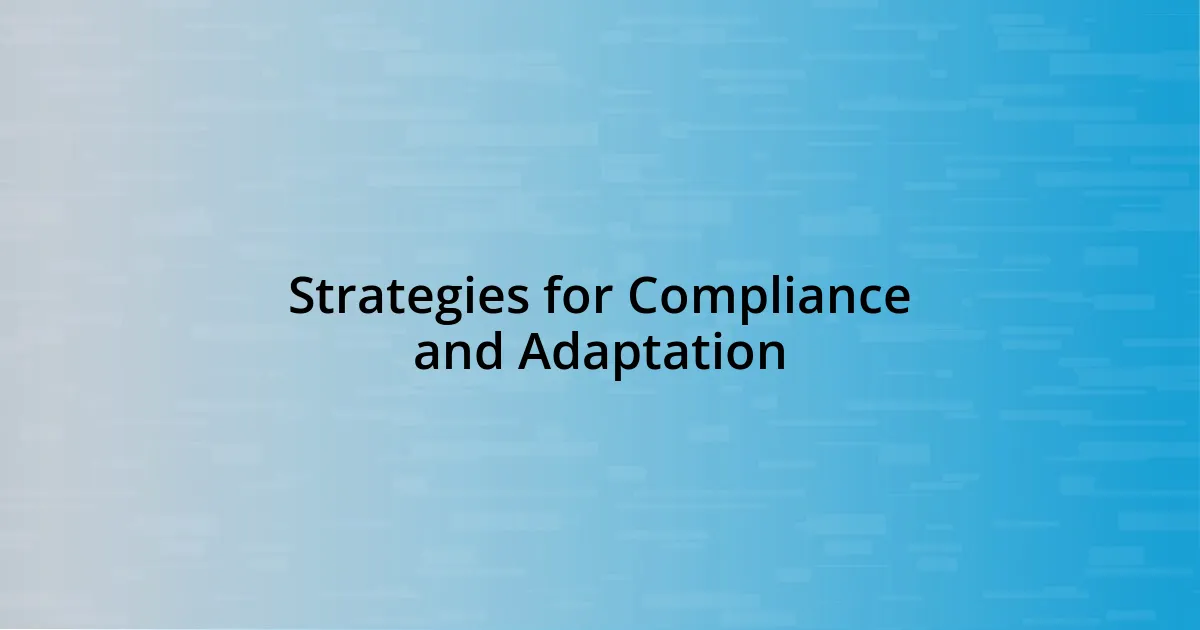
Strategies for Compliance and Adaptation
Adapting to new regulations requires a proactive approach, which I believe starts with fostering a compliance-oriented culture within organizations. In my experience, when compliance is woven into the fabric of a company’s values, it leads to more authentic engagement from employees. It’s fascinating how a simple shift in perspective can transform what feels like burdensome rules into a team mission that encourages collective responsibility. Have you ever observed how motivated individuals can be when they feel part of a greater purpose?
Furthermore, leveraging technology can significantly streamline compliance processes. I once spoke with an IT manager who shared how implementing a robust compliance software system saved their department countless hours, allowing them to focus on strategic initiatives instead of simply ticking boxes. This insight reinforced my belief that embracing digital tools isn’t just about compliance—it’s about empowering teams to innovate without the shackles of administrative duties weighing them down.
Lastly, staying informed and connected with industry peers is crucial for navigating regulatory changes effectively. I vividly remember attending an industry conference where passionate discussions regarding regulatory trends sparked enlightening conversations. Everyone was eager to share their challenges and successes, creating a communal sense of support. It made me consider how isolating the compliance journey can feel, yet collaboration opens doors to shared solutions. Isn’t it reassuring to know that together we can navigate these waters more smoothly?
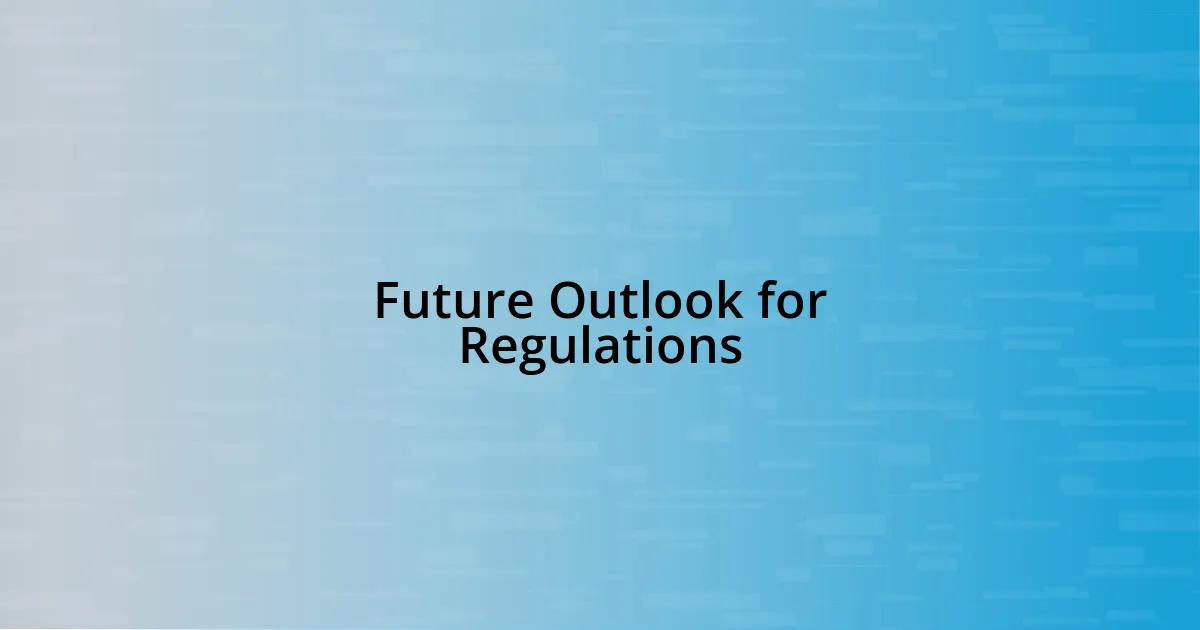
Future Outlook for Regulations
Looking ahead, I believe the regulatory landscape will increasingly prioritize sustainability and ethical practices. Recently, I participated in a seminar on environmental regulations, where the overwhelming consensus was that regulators are not just looking for compliance, but genuine commitment. It made me think—how can businesses integrate these values into their core operations rather than viewing them as mere obligations?
Moreover, the rise of technology in regulatory frameworks will likely shape future compliance practices. I once attended a panel discussion about artificial intelligence in regulatory monitoring, where experts shared how machine learning algorithms can predict compliance risks before they become issues. It left me pondering—could this shift not only ease the burden on companies but also foster an environment of proactive improvement?
As we move forward, the importance of cross-border regulations can’t be overlooked. In a recent chat with an entrepreneur, he expressed how navigating different regulatory requirements across countries felt like running a marathon with no finish line in sight. Doesn’t it raise questions about the consistency and fairness we expect in a global marketplace? I find it crucial for businesses to embrace a global mindset now, preparing for an interconnected regulatory environment that waits for no one.

Conclusion and Key Takeaways
Reflecting on regulatory trends, it’s clear that adaptability is vital. I once faced a sudden shift in compliance requirements at work, and the initial panic quickly transformed into an opportunity for growth. Have you ever felt that fear give way to creativity when changes sparked new ideas? Embracing a proactive mindset can turn challenges into stepping stones for innovation.
One of the most significant takeaways is the necessity of collaboration. I remember collaborating with various departments during a compliance overhaul, and it wasn’t just about meeting regulations; it strengthened our teamwork. How often do we underestimate the power of communication in making these transitions smoother? Engaging with others can illuminate blind spots and foster a sense of shared ownership over compliance responsibilities.
Ultimately, the future hinges on our willingness to innovate and integrate ethical practices into our business models. I once read a case study that highlighted a company thriving because it prioritized sustainability, resulting in greater customer loyalty. Isn’t it inspiring to think that doing the right thing can also drive success? As we forge ahead, let’s consider how embracing these regulatory trends can not only help us comply but also pave the way for a brighter, more responsible future in our industries.








